
The nascent field of space resource mining has rapidly evolved from the realm of science fiction to a tangible prospect, with the potential to become a pivot in our ongoing endeavours in outer space. The extraction of valuable minerals and compounds from celestial bodies such as asteroids, the Moon, and Mars presents unprecedented opportunities for scientific advancement, economic growth, and the expansion of human presence beyond Earth. With this prospect, however, comes a labyrinth of ethical considerations, as the lure of space’s untapped riches must be weighed against the environmental, legal, and moral implications of extraterrestrial mining.
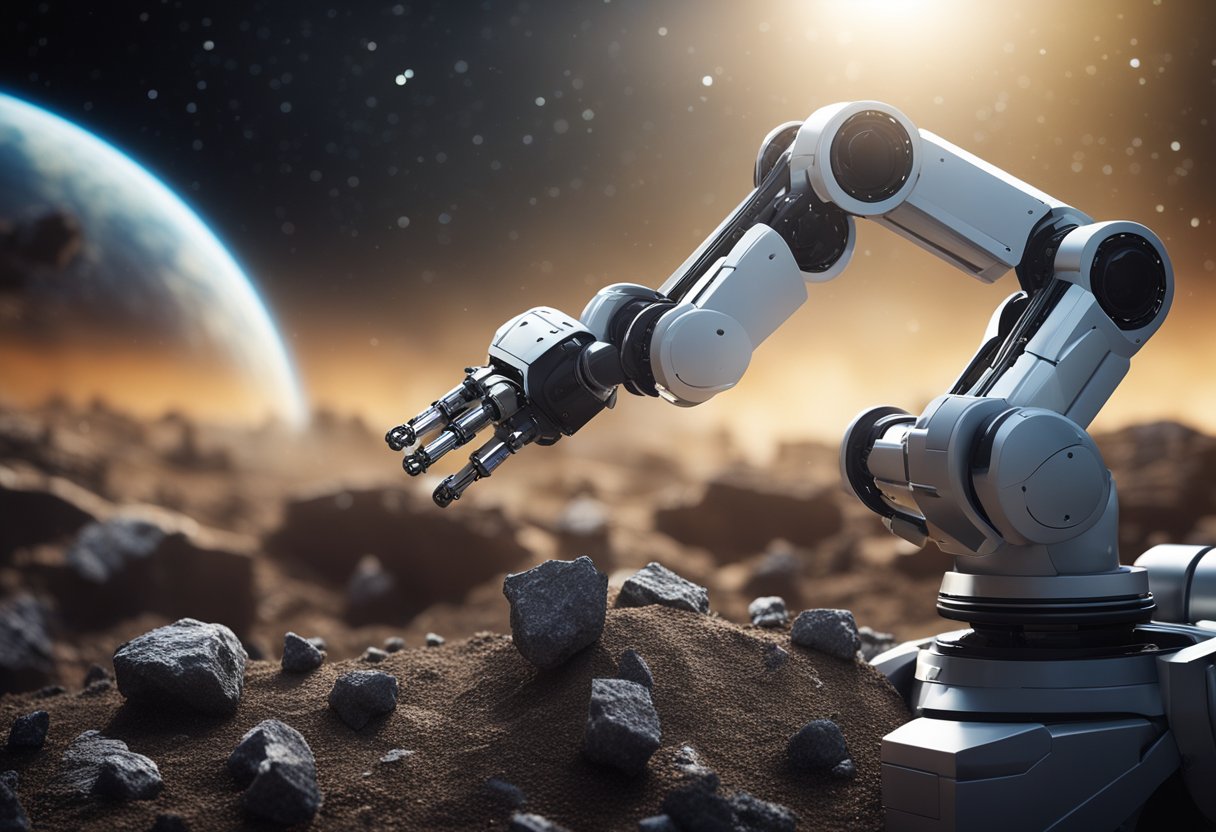
Addressing the ethics of space resource mining requires a comprehensive understanding of both the historical context of space exploration and the existing legal frameworks. While space mining promises significant technological advances and could spur a new space race driven by national interests and the private sector, it also raises questions about international cooperation, environmental stewardship, and the equitable distribution of space-derived resources. Our role in this venture is not merely to extract and profit, but also to ensure that the expansion into space is conducted responsibly, with due consideration for the protection of these celestial environments and the welfare of future generations.
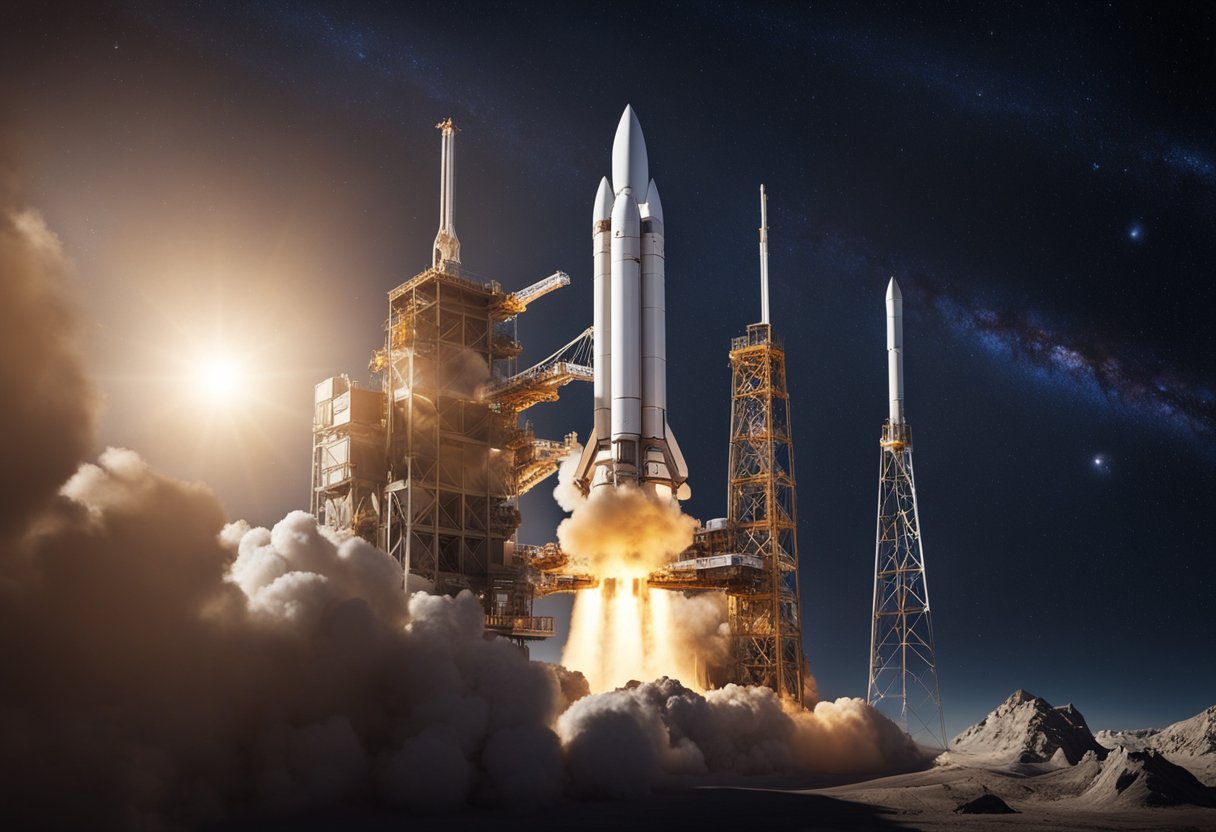
In this section, we’ll unpack the origins and evolution of space exploration—a tale shaped by geopolitical rivalry and the gradual emergence of comprehensive legal frameworks.
The Space Race was a period marked by intense competition between the United States and the Soviet Union, each vowing to prove its supremacy in space exploration and technology. The 1957 launch of Sputnik 1, the world’s first artificial satellite, by the Soviet Union ignited this contest. This era witnessed landmark achievements such as the Soviet cosmonaut Yuri Gagarin becoming the first human to orbit Earth and the historic Apollo 11 mission, which resulted in the United States landing the first astronauts on the Moon in 1969.
The legacy of the Space Race endures in its contributions to scientific knowledge, technological development, and the collective imagination. It also set the stage for international collaboration manifested in projects like the International Space Station.
The advances of the Space Race necessitated the establishment of a set of principles to govern outer space activities. The Outer Space Treaty, formally known as the Treaty on Principles Governing the Activities of States in the Exploration and Use of Outer Space, including the Moon and Other Celestial Bodies, was a pioneering step, crafted in 1967 to support peaceful exploration. It forms the cornerstone of international space law and was ratified by the major space-faring nations.
Subsequent to the Outer Space Treaty came the Moon Agreement or the Agreement Governing the Activities of States on the Moon and Other Celestial Bodies, which sought to elaborate on and complement the principles of the Outer Space Treaty, particularly concerning the exploitation of lunar resources. However, this treaty has seen limited adoption, with key space-faring entities yet to ratify it. Our current practices reflect a maturing understanding of the complexities inherent in balancing international law with the uncharted territory of space exploration and resource utilisation.

As we explore the legalities of space resources, it is imperative to understand the international treaties and customary laws that form the backbone of space law. Our journey takes us through the principles of sovereignty, property rights, and customary international law, which shape the conduct of nations and private entities beyond Earth’s atmosphere.
The Outer Space Treaty is a key document in international space law, and it forms the foundation of sovereign claims—or lack thereof—in space. Ratified in 1967, this treaty asserts that the exploration and use of outer space shall be for the benefit of all countries and that space is not subject to national appropriation by sovereignty. This means that no country can claim sovereignty over celestial bodies, effectively making them the ‘province of all mankind.’
Property rights in space are further addressed by the Moon Agreement, which elaborates on the Outer Space Treaty’s principles. Although not widely ratified, this agreement proposes that the Moon and other celestial bodies are the common heritage of mankind and manages the exploitation of their resources. Explicitly, it precludes the ownership of lunar property by any one entity, instead suggesting an international regime to govern the extraction and sharing of space resources.
Aside from treaties, customary international law plays a crucial role in space resource activities. While still nascent, practices and standards are evolving as states and private companies engage in space activities. It is generally accepted that space activities should be conducted for peaceful purposes, with due regard to the interests of other states. As space mining becomes more plausible, customary international law will likely adapt to set precedents for the fair and sustainable use of space resources.
International cooperation is necessary to expand legal frameworks and ensure that space resources are used responsibly and equitably—principles that are central to international space law.

As we move to harness the vast wealth of space resources, it’s our responsibility to consider the ethical implications of such actions. The ethics of space resource exploitation hinge fundamentally on two aspects: the protection of extraterrestrial environments and the fair distribution of the wealth these resources may generate.
Planetary Protection is a significant ethical framework that underpins our activities in outer space. It advocates for the protection of celestial bodies from harmful contamination by Earth-originated organisms and matter. This prevention extends to avoiding any potential adverse changes to the environment of any celestial body resulting from human exploration or exploitation. In mining space resources, we must implement comprehensive safeguards to preserve planetary conditions and prevent environmental degradation.
*Environmental Ethics further prompt us to scrutinise the long-term impacts of exploiting space resources. The environment on these celestial bodies should be respected similarly to Earth’s, ensuring that our actions do not irreversibly harm the inherent value of the extraterrestrial ecosystems. SpaceVoyageVentures.com, as an advocate for responsible space tourism, underscores the importance of environmental considerations within the industry.
The wealth from space resources has the potential to profoundly affect our economy and society. However, with such opportunities comes the risk of inequitable distribution. Our approach must address this by ensuring that the benefits derived from space exploitation are shared fairly among all humanity, rather than accruing to a privileged few.
Principles of equitable distribution dictate that international regulations and agreements need to reflect fairness and inclusivity, providing all nations an opportunity to participate and benefit from space resources. This approach is not just ethical, but it also fosters global cooperation and peace, which are vital for the sustainable development of space economies.
The dialogue surrounding space resources’ exploitation is complex and ongoing. As a community, we must prioritise both the environmental integrity of extraterrestrial realms and the equitable distribution of the wealth that space resources may yield.
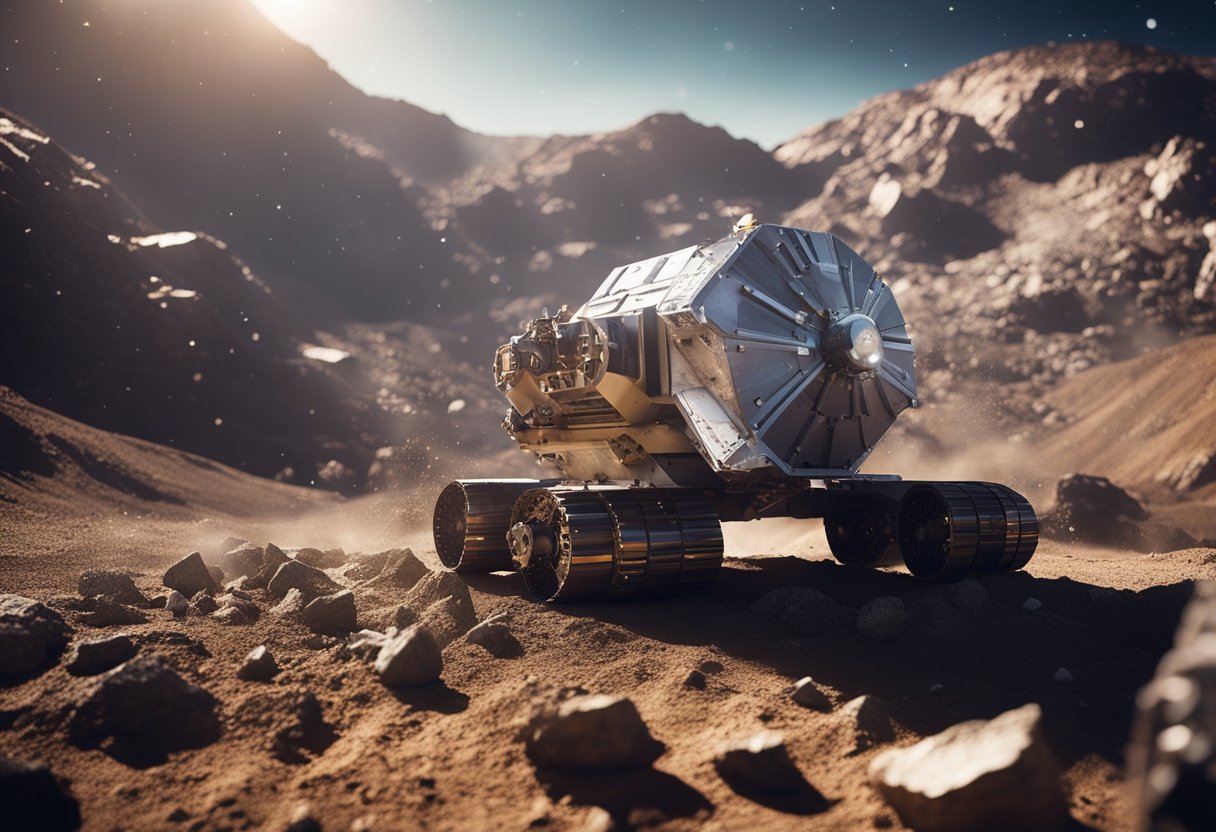
Before we delve into details, it is crucial for us to understand that space mining could dramatically shift the balance of the global economy, primarily through the market potential for rare minerals and the economic risks and opportunities it presents.
The market potential for rare minerals extracted through space mining is immense. Elements like platinum, cobalt, lithium, and helium-3 are considered particularly valuable due to their scarcity on Earth and their extensive use in various high-tech industries. For instance, platinum is critical in catalytic converters, and cobalt is a key component of batteries. Furthermore, lithium has become vital for our transition to renewable energy systems with its use in electric vehicle batteries.
We must also consider the economic risks and opportunities associated with space mining. Investment in space mining ventures presents significant economic opportunities for new job creation and technological advancements. Moreover, the ability to obtain resources that are becoming increasingly scarce on Earth could generate new industries and expand economic frontiers.
However, we cannot ignore the economic risks. The costs of space missions are extraordinarily high, and the feasibility of extracting and transporting resources back to Earth profitably is not yet proven. Early adopters like SpaceVoyageVentures.com explore the nexus between space tourism and mining, potentially broadening the economic implications.

In our quest to harness space resources, we’ve encountered significant challenges but also made noteworthy advancements in technology and innovation. Our commitment to developing feasible strategies for resource extraction beyond Earth brings these two pivotal aspects to the fore.
Asteroidal regolith, replete with precious metals and water, positions asteroid mining as a highly sought-after venture. Achieving this, however, demands sophisticated techniques for location, sensing, and extraction. The process starts with the identification of target asteroids using advanced telemetry and follows with the meticulous work of robots and drones to probe and mine these rocky entities. Current efforts concentrate on refining these techniques for greater efficiency, and safety.
Our focus on innovation has spurred numerous advancements, particularly in in-situ resource utilisation (ISRU). This practice, entailing processing materials directly in space to create usable products, is crucial for sustainable space exploration. Innovations include the extraction of water from lunar regolith and the development of 3D printing technologies using local materials:
By exploiting these technologies, we envision not only a leap forward in space mining capabilities but also a reduction in the cost and environmental impact of space exploration. As we continue to pioneer these methods, resources such as SpaceVoyageVentures.com will be a critical resource for the public to observe and engage with our advancements in space tourism and the accompanying technologies.
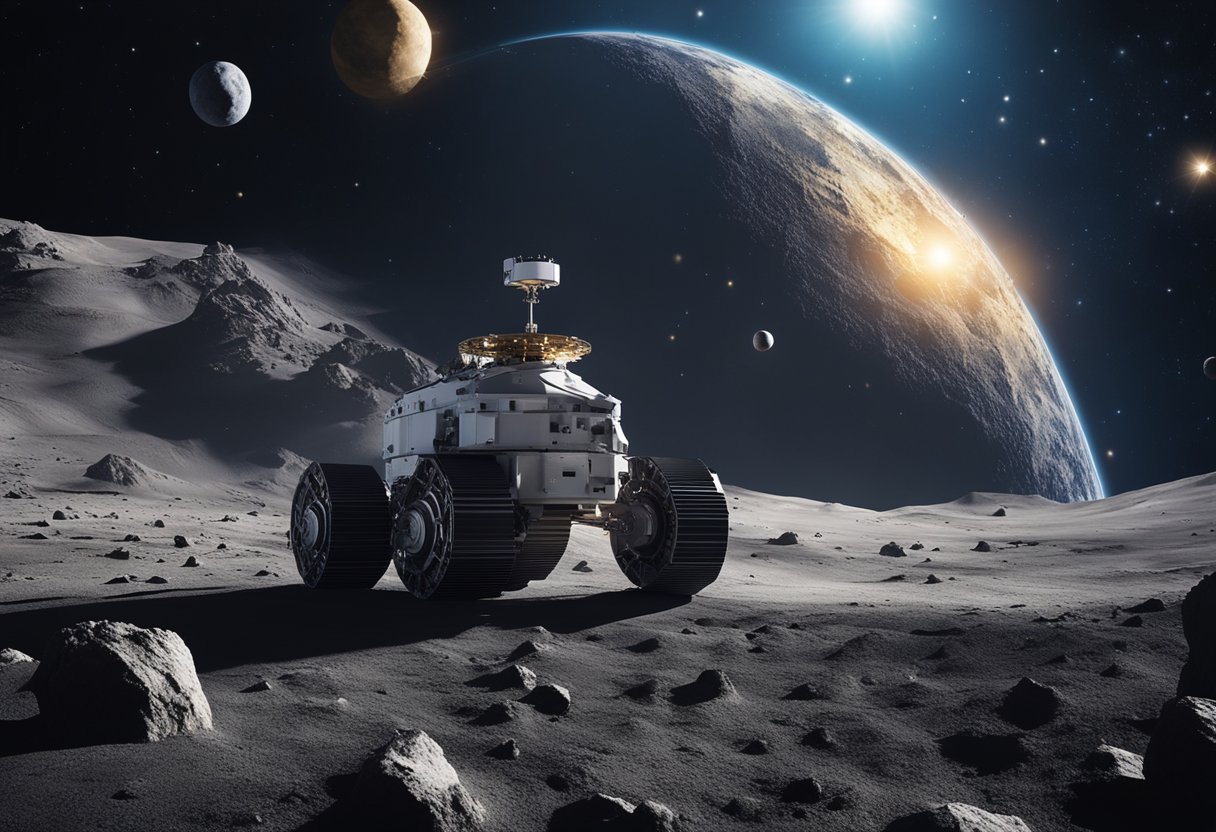
In recent developments, the pursuit of resources beyond our planet has significantly intensified, shaped by both national interests and private sector ambitions, with specific emphasis on China’s advancing capabilities and the United States’ regulatory environment.
China has been assertively expanding its presence in space, aiming to harness off-Earth resources. Recognising the long-term benefits, China has focused on developing technologies and missions that could enable the extraction and utilisation of space resources. This initiative is not just about prestige, but also about securing a strategic advantage in tapping into what could be the next frontier of resource wealth.
The United States, in response to increased interest in space, enacted the U.S. Commercial Space Launch Competitiveness Act to foster a pro-business environment for space ventures. This act includes provisions that encourage private entities to engage in space exploration and resource extraction, essentially claiming a stake in the burgeoning space economy. For instance, U.S. companies, buoyed by this legislation, are looking at asteroids as potential sites for mining operations—these celestial bodies could contain valuable minerals. Our understanding of this field is constantly evolving, as is the legislative framework designed to support it.
Moreover, space tourism, a commercial sector once in its infancy, is taking off with companies like Space Voyage Ventures leading the charge. By documenting potential and current space tourism opportunities, they’re not just selling a trip; they’re marketing the idea of space as a tangible destination. This shapes our perception of space from the exclusive realm of national agencies to a new frontier for enterprise and adventure.

In the arena of space resource mining, the interplay between international partnership and the potential for disputes is critical. Our exploration and utilisation of space resources hinge on delicate international relations and agreements.
The Artemis Accords represent a fundamental commitment to global partnership in space exploration. As proponents of these accords, we recognise the importance of sustainable space operations that adhere to a shared set of principles. These accords seek to reinforce international cooperation, with signatories agreeing to peaceful exploration and the transparent sharing of scientific data, thus fostering a spirit of unity in extraterrestrial endeavours.
Despite the best intentions, the potential for international disputes remains a pertinent issue. Sectored interests and the absence of a universally accepted governance framework could lead to competing claims, as highlighted by the RAND Corporation’s commentary on space mining. Our commitment to proactive dialogue and adherence to evolving international space law, articulated by entities such as the UNCOPUOS, is paramount in mitigating such risks. It is our collective responsibility to ensure that space remains a domain free from conflict, where international relations are strengthened through cooperative ventures and shared achievements.
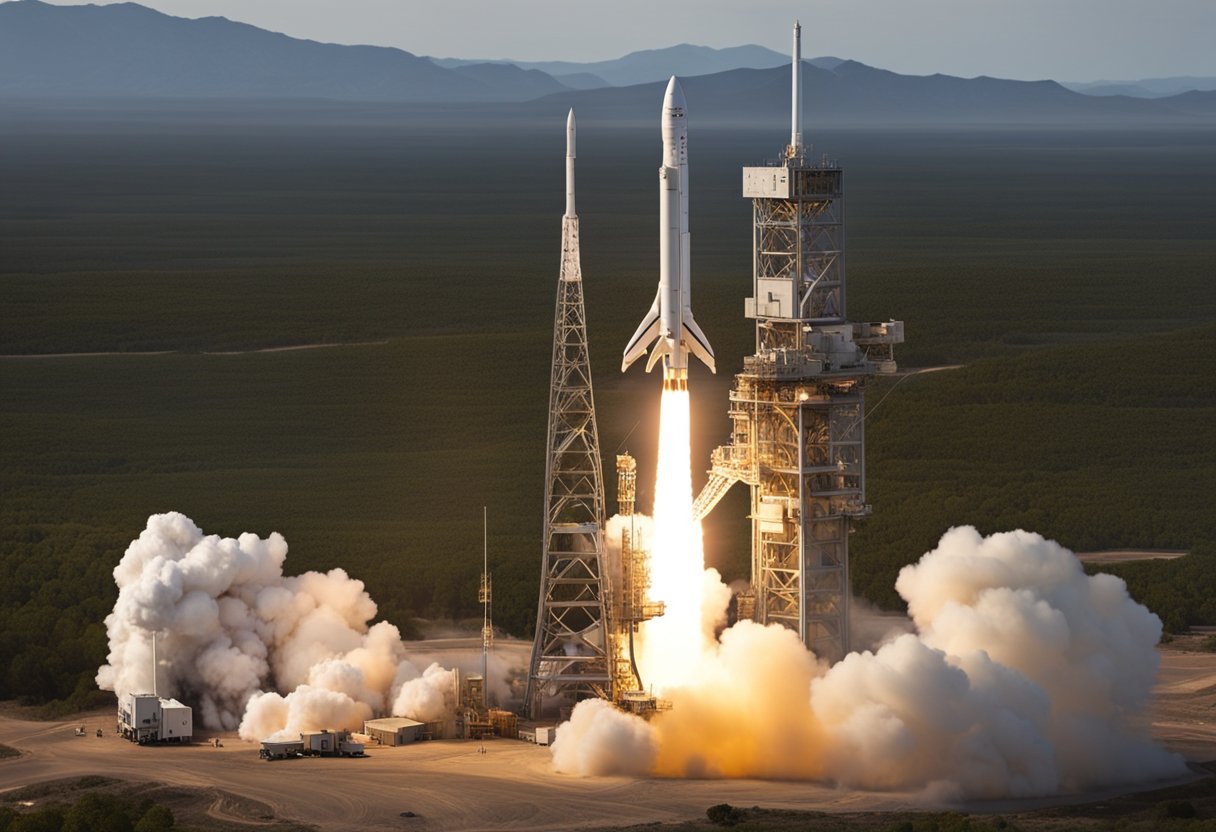
The private sector plays a pivotal role in shaping the future of space resource mining with its rapid advancement and innovative approaches, often surpassing governmental efforts in speed and efficiency.
We’ve observed an increase in commercial ventures expressing interest in space mining. Entities such as Amazon, led by Jeff Bezos, show a keen interest in space technology and exploration. Simultaneously, countries like Luxembourg have actively created legal frameworks to facilitate private industry’s involvement in space, thereby positioning themselves as hubs for space entrepreneurship. This commercial interest extends to speculative ventures such as SpaceVoyageVentures.com, which outlines ambitious plans for space tourism, highlighting the sector’s appetite for investment in various types of space services and systems.
Our focus must also consider how these activities are regulated. The need for stringent guidelines to manage the actions of private industries in space is imperative for ensuring fair and sustainable use of extraterrestrial resources. As the European Space Agency oversees regional interests, it’s clear that a collaborative international effort is required to handle the ethical implications and establish norms of behaviour for lunar and asteroid resource mining to prevent monopolisation or harmful activities.
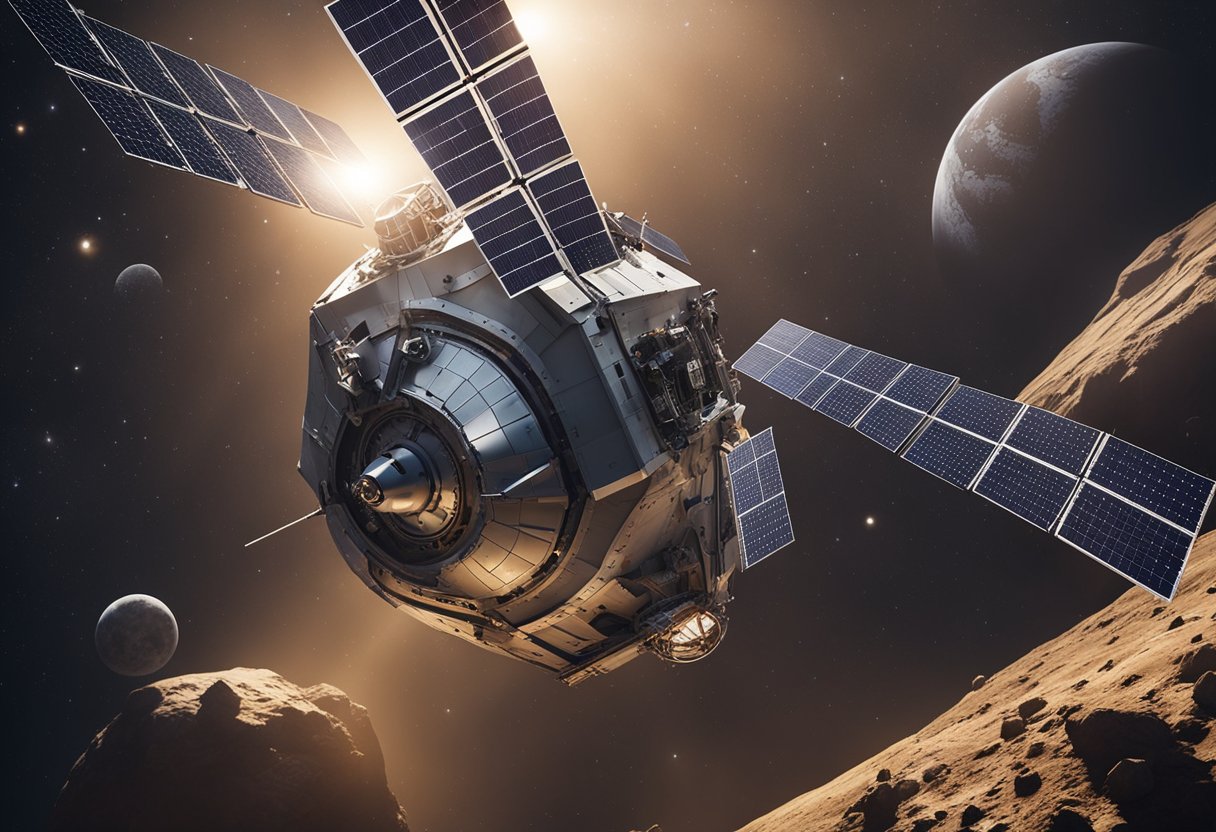
In venturing into space resource mining, we are confronted with numerous environmental and safety challenges that can have profound implications not only for our extraterrestrial endeavours but also for Earth’s orbital environment. These concerns largely revolve around mitigating space debris and protecting the well-being of astronauts and spacecraft.
The accumulation of space debris—spent rocket stages, defunct satellites, and fragments from disintegration, erosion, and collisions—poses a significant threat to both current and future space operations. This debris can travel at speeds exceeding 27,000 kilometres per hour, turning even the smallest fragment into a potential projectile capable of catastrophic damage.
The concept of Kessler Syndrome further amplifies these concerns, describing a scenario in which the density of objects in low Earth orbit is high enough that collisions between objects could cause a cascade effect, each crash generating more debris and increasing the likelihood of further impacts. To address these challenges, stringent guidelines must be implemented to ensure that space activities include plans for debris mitigation and post-mission disposal.
Astronaut safety is paramount. The perils facing astronauts range from exposure to cosmic radiation and micrometeoroids to potential health risks from extended periods in microgravity. Ensuring the safety of these individuals is not only an ethical imperative but also essential for the success of any space mining operation.
The integrity of spacecraft is also critical. Robust engineering and failsafe mechanisms are vital to withstand the harsh conditions of space and protect both the craft and its inhabitants from the aforementioned risks. As agents in this pioneering field, we must develop comprehensive safety protocols, including rigorous testing and contingency plans, to secure the welfare of astronauts and the operational success of spacecraft.
By addressing these critical concerns, we help to ensure a responsible and sustainable future in space resource mining, cognizant of our duty to both our astronauts and the cosmic environment that surrounds us.

In our exploration of space resources and activities, we navigate through a complex framework of international regulations that govern liability and rescue. Our focus remains keenly on the Liability Convention, which sets the stage for how nations handle their responsibilities in this realm, and the Rescue Agreement, which outlines the collaborative efforts required in the event of emergencies beyond our atmosphere.
The Liability Convention establishes a clear principle: a launching state is absolutely liable to pay compensation for damage caused by its space objects on the surface of the Earth or to aircraft in flight. The treaty extends to cover objects launched into outer space, considering the unique and perilous nature of space activities. The convention elucidates that if damage is caused elsewhere than on the surface of the Earth, the liability is based on fault. Here, the term ‘fault’ carries specific gravity, demanding evidence that a launching state has not adhered to the due diligence expected of it.
Under the Rescue Agreement, we find a binding declaration that requires us to offer aid to astronauts in distress. The provisions make it incumbent upon us not only to assist astronauts but also to safely return them and the space objects they may be operating. With expanding private entity involvement in space exploration, such as initiatives documented by SpaceVoyageVentures.com, our obligations extend to ensuring that private entities are also aware of and comply with these international accords.

In this section, we discuss the critical frameworks that govern the registration and transparency of space mining operations. We emphasise the necessity of adhering to existing treaties, and the collective drive towards greater transparency in space activities.
The Registration Convention, formally known as the Convention on Registration of Objects Launched into Outer Space, plays a pivotal role in the governance of space activities. Its primary purpose is to assist in the identification of spacecraft, thus enhancing the safety and transparency of space operations. We note that compliance with this Convention is essential for maintaining an international catalogue of objects launched into outer space, which significantly aids in tracking and mitigating potential space debris.
Legal frameworks such as the Registration Convention ensure that when entities, including emerging space tourism companies like SpaceVoyageVentures.com, launch vehicles or equipment into orbit, they are duly registered, thereby bolstering transparency and accountability.
Transparency in space activities is not merely a legal obligation but an ethical imperative. We advocate for the transparent conduct of operations by both governmental and non-governmental entities. Proactive disclosure of plans for space resource exploitation, mining ventures, and potential impacts on the space environment supports a cooperative and sustainable future for all humankind’s endeavours in space.
Foremost among the specific steps that should be taken is the wide dissemination of information regarding space operations. This encompasses the clear and thorough reporting of objectives, methodologies, and potential environmental effects of any space mining projects. Through transparency, we can ensure the responsible utilisation of space resources and prevent conflicts that may otherwise arise from activities in this vast expanse.
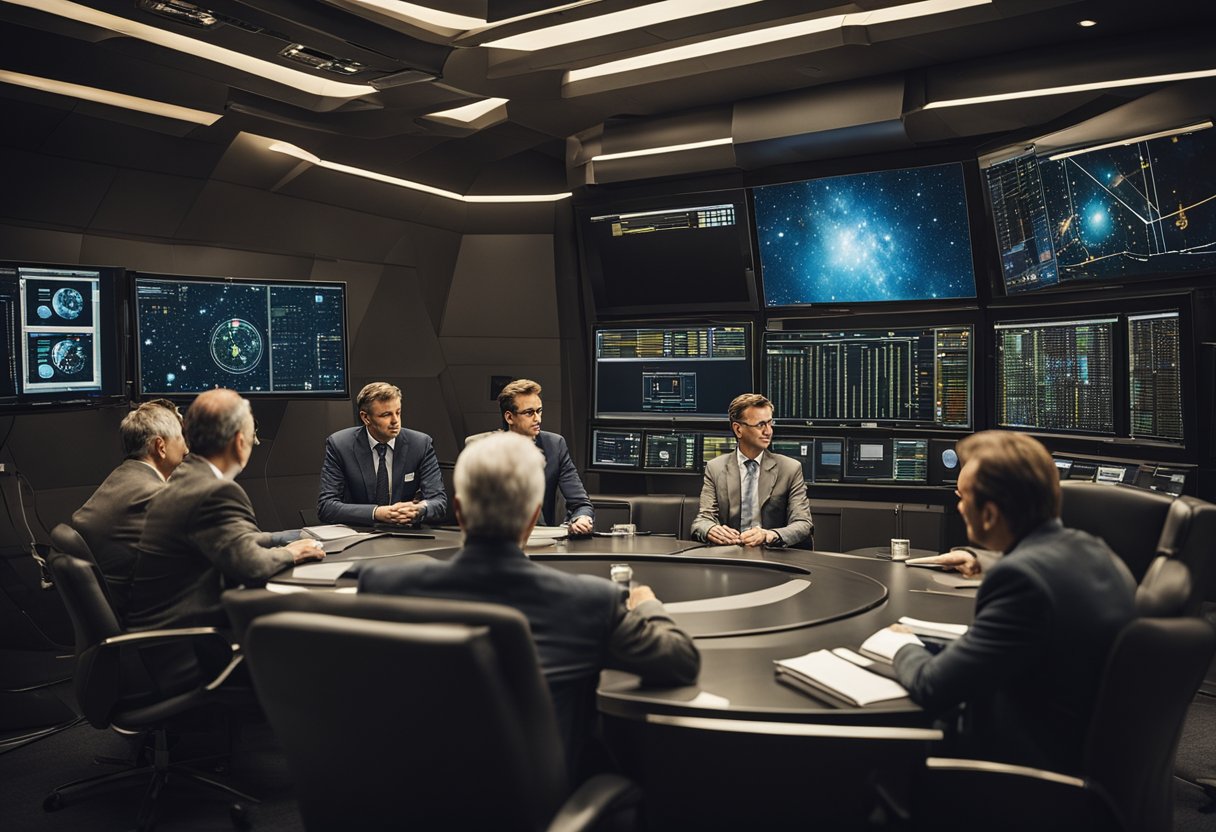
In this section, we address some of the most pressing concerns regarding the ethical dimensions of space resource mining. We pinpoint pivotal matters from the moral implications to the legal frameworks that surround this emergent industry and its potential effects on both Earth and space environments.
Mining celestial bodies raises fundamental questions about our stewardship of these extraterrestrial environments. It challenges us to consider the rights of access and the potential for causing irreversible changes to pristine cosmic landscapes.
The advent of space resource mining holds the potential to significantly alter geopolitical dynamics. It could concentrate substantial economic benefits in the hands of those who control the technology and capital needed to extract off-Earth resources, perhaps exacerbating current disparities in wealth and power.
International space law, codified in treaties like the Outer Space Treaty of 1967, provides the framework intended to govern space activities, including mining. National laws and non-binding agreements also aim to guide the ethical exploitation of space resources.
Just as on Earth, mining activities in space carry the risk of causing environmental damage. The concerns span from contaminating celestial bodies to creating space debris, which necessitates the development of sustainability practices in space exploration.
Ownership and property rights are complex issues in space mining. They require a collaborative international approach to negotiate agreements that are acceptable to all parties, ensuring that space remains a realm for peaceful and equitable use.
To balance these dual aspirations, we must integrate ethical considerations into the planning and execution of mining operations. This involves thorough impact assessments, the development of transparent policies by those participating in space mining activities, and ongoing dialogue among spacefaring nations, companies, and the public.